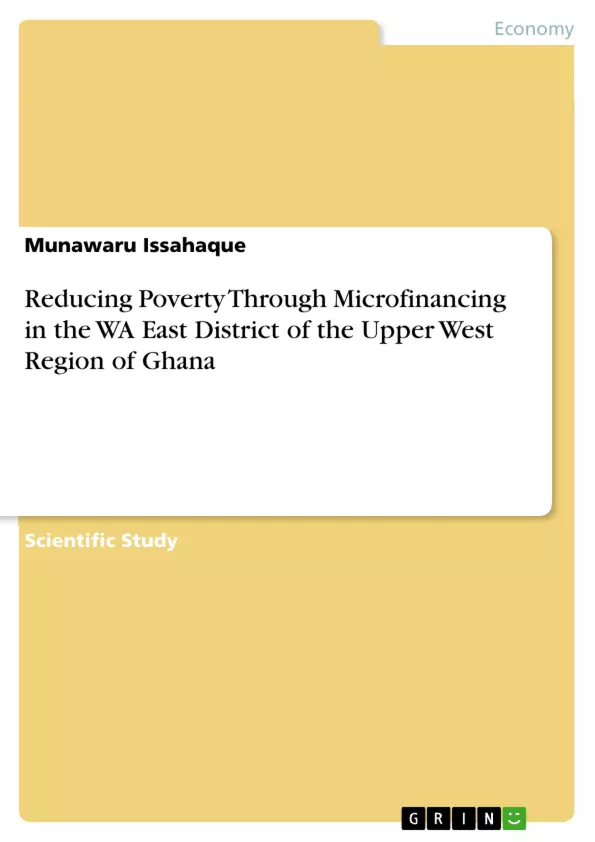The purpose of the study was to determine the impact of micro finance in reducing poverty in the Wa East District of the Upper West Region of Ghana. The hypothesis of the study was "micro loans when used on income generating activities will lead to poverty reduction."
The spreadsheet programme was used to do the analysis on reducing poverty through micro financing in the Wa East District of the Upper West Region of Ghana. The theoretical frame work was based on the Foster-Greer-Thorberke Class Index. The researcher also used "costs of basic needs" method to calculate head count poverty in order to compare consumption expenditure of MASLOC and Non MASLOC families. The study had a Crounbach reliability Coefficient of .95 after pilot test.
Data were collected from MASLOC records as age, sex, business and household expenditure. The researcher also collected data from some 50 MASLOC applicants who received loans and 50 others who did not receive the loans in order to triangulate the data on household expenditure, number of individuals in household including other bio-data. It was found that poverty reduced slightly for MASLOC families than for Non MASLOC families. The researcher recommends that government, development partners and Non-governmental organizations must collaborate to increase micro loans to the people of Wa East District in Upper West Region of Ghana in particular and the productive poor in general.
Inhaltsverzeichnis (Table of Contents)
- Introduction
- Objectives of the Study
- Summary of Literature Review
- Research Methodology
- Findings and Discussion
- Conclusion and Recommendations
Zielsetzung und Themenschwerpunkte (Objectives and Key Themes)
This research aims to evaluate the impact of microfinance in reducing poverty within the Wa East District of the Upper West Region of Ghana. Specifically, it focuses on analyzing the effectiveness of micro-credit schemes provided by MASLOC (Microfinance and Small Loans Centre) in poverty alleviation. The study utilizes a quantitative approach, drawing on data collected from MASLOC records and surveys of beneficiaries and non-beneficiaries.
- The role of microfinance in poverty reduction
- Impact of micro-credit schemes on household income and poverty levels
- The effectiveness of MASLOC in reaching the most vulnerable populations
- The challenges and opportunities associated with promoting microfinance in Ghana
- The potential of microfinance to empower women and enhance their economic well-being
Zusammenfassung der Kapitel (Chapter Summaries)
- Introduction: This chapter introduces the concept of microfinance and its potential to alleviate poverty, highlighting the dire need for poverty reduction in the Upper West Region of Ghana. The research objective is stated, aiming to investigate the impact of micro-credit schemes provided by MASLOC on poverty levels in the Wa East District.
- Objectives of the Study: This chapter outlines the specific objectives of the study, including the assessment of poverty levels in the district, the analysis of poverty characteristics, and the formulation of recommendations for microfinance practitioners, policymakers, and government.
- Summary of Literature Review: This chapter presents a comprehensive overview of existing literature on microfinance and its impact on poverty reduction. It examines various perspectives and studies, highlighting the positive and negative aspects of micro-credit programs. The chapter discusses the arguments for and against the effectiveness of microfinance, referencing research findings from diverse sources, including studies in Bangladesh, India, and the United States.
Schlüsselwörter (Keywords)
The main keywords and focus topics of the text include microfinance, poverty reduction, MASLOC, micro-credit, Ghana, Upper West Region, Wa East District, household income, economic empowerment, women, development, and social impact. The research explores the role of microfinance in alleviating poverty and promoting economic development, particularly for women, within the context of the Upper West Region of Ghana.
Frequently Asked Questions
What was the goal of the microfinance study in Ghana?
The study aimed to determine if micro-loans, specifically from MASLOC, effectively reduce poverty in the Wa East District of Ghana.
What is MASLOC?
MASLOC stands for the Microfinance and Small Loans Centre, a government-backed scheme in Ghana designed to provide credit to the productive poor.
Did microfinance successfully reduce poverty in the study?
The research found that poverty reduced slightly more for families who received MASLOC loans compared to those who did not.
How was the poverty level measured?
The researcher used the "costs of basic needs" method and the Foster-Greer-Thorbecke Index to compare consumption expenditures between loan recipients and non-recipients.
What are the recommendations for policymakers?
The study recommends that the government and NGOs collaborate to increase micro-loan availability, especially for women and the vulnerable poor in rural districts.
- Quote paper
- Dr. Munawaru Issahaque (Author), 2013, Reducing Poverty Through Microfinancing in the WA East District of the Upper West Region of Ghana, Munich, GRIN Verlag, https://www.grin.com/document/461298



